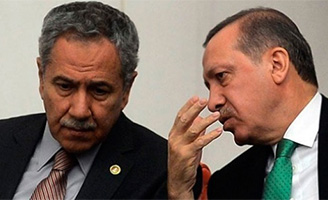Battles and Wars: Bracing for Erdoğan’s Long Goodbye
By Gareth Jenkins (vol. 8, no. 6 of the Turkey Analyst)
On March 20, 2015, Turkish President Recep Tayyip Erdoğan publicly criticized the announcement by the ruling Justice and Development Party (AKP) that it was planning to establish a monitoring committee to oversee discussions about reforms on the Kurdish issue. On March 21, 2015, Government Spokesperson Bülent Arınç bluntly told Erdoğan not to interfere in the running of the government. Arınç repeated his admonition the following day. It was the first time that a leading member of the AKP had issued such an outspoken public challenge to Erdoğan’s authority.

What the Columnists Say
Abdülkadir Selvi in Yeni Şafak asks what’s happening to the AKP, and warns that the spell of the party as the symbol of stability is being broken. Orhan Bursalı in Cumhuriyet writes that the exposure of an internal power struggle no doubt creates certain question marks in the minds of voters, but that the impact on voter behavior is marginal. What matters more, he writes, are the mounting economic problems and the impression that the government is surrendering to PKK. Kadri Gürsel in Milliyet writes that AKP will lose either Kurdish voters or Turkish nationalists in the upcoming elections, depending on whether it is Erdoğan or the government that sets the course, and that regardless, Erdoğan’s dreams of presidential rule is going to be the casualty. Oya Baydar on the t24 news site draws attention to a belligerent ultimatum that was issued by the General Staff in response to the Newroz message of PKK leader Abdullah Öcalan. Baydar warns that military tutelage is making a comeback.

What the Columnists Say
Aslı Aydıntaşbaş in Milliyet writes that it’s not certain that pro-Kurdish HDP will cross the ten percent threshold to parliament, but she notes that polls indicate an upward trend. However, HDP will have to be wary of provocations and assure the Turkish public beforehand that it has got nothing to do with any acts of violence that may be staged during the run-up to the election in June. Oya Baydar on the t24 news site writes that the sine qua non for electoral success is that the HDP makes sure to forcefully deny and dispel the rumors that certain circles are spreading that the HDP has come to an agreement with Erdoğan to introduce a presidential system. Ali Bayramoğlu in Yeni Şafak predicts that the elections are going to confirm that both AKP and HDP benefit from the headway that is being made in the solution process. Ahmet İnsel in Radikal writes that the HDP has the potential to become the Freedom Movement for Turkey, provided that the line of its co-chairman Selahattin Demirtaş is not sabotaged by forces from within the Kurdish political movement itself.

The Return of Hakan Fidan to MİT is the Sign of a Power Struggle
By M. K. Kaya (vol. 8, no. 5 of the Turkey Analyst)
The row over Hakan Fidan, Turkey’s reinstated intelligence chief, is suggestive of shifting power realities and rivalries within the AKP regime. Prime Minister Ahmet Davutoğlu suffered a serious setback when he was forced to let Hakan Fidan return to MIT. President Recep Tayyip Erdoğan needed not only to have his confidante back at the helm of the critically important MIT, but also to ensure that the circle around Davutoğlu did not succeed in its bid to become a power centre on its own right. Erdoğan correctly saw the emerging Davutoğlu-Fidan alliance as an alliance that had the potential to reconfigure the power status quo within the AKP.

What are Erdoğan’s Real Intentions in the Kurdish “Solution Process?”
By Burak Bilgehan Özpek (vol. 8, no. 5 of the Turkey Analyst)
President Recep Tayyip Erdoğan’s bid to concentrate all power to himself has increased the skepticism and reluctance among the representatives of the Kurdish political movement and among liberals. The suspicion is widespread in Turkey that the “solution process” of the Kurdish problem is going to pave the way for a fully authoritarian government. What many fear is that Erdoğan is using the solution process and the promise of Kurdish peace as instruments in his bid to consolidate his position as the unchecked leader of the country.








